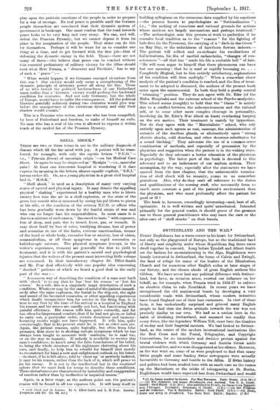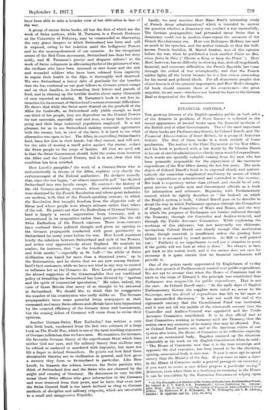SWITZERLAND AND THE WAR..
Evarry Englishman has a warm corner in his heart for Switzerland, not only as the playground of Europe, but as the traditional land of liberty and simplicity under whose Republican flag, three, races dwell together in concord. Long before Tyndall and Albert Smith set the fashion for mountaineering in the Alps, Euglislunen woes keenly interested in Switzerland, the home of Calvin and Zwingli, the land of refuge for many of the leaders of the Elizabethan Church and for numerous other English exiles at later stages of our history, and the chosen abode of great Fanglulr• authors like Gibbon. We have never bad any political difference with Switzer- land, but have, as occasion. arose, exerted our influence on her behalf, an, for example, when Prussia tried in 1856-57 to enforce an obsolete claim to rule NouchiteL In recent year& we have strengthened the old, sentimental bonds by developing a very considerable trade with. Switaerland, whose modern industrial have found. England one of their best customers. In view of those taste, it has undoubtedly surprised and grieved many ISiglisla people to find that the Swiss attitude towards the war ware not precisely similar to our own. We had. as a nation been in the habit of idealizing Switzerland, and assumed too readily that every Swiss, like the legendary William Tell, must hate the. Casale.. of to-day-and their Imperial masters. We had looked be Switzer- land, as the centre of the modern international institutions like the Red Cross and the Postal. Telegraphic, and Copyright Conventions, for an immediate and decisive protest against die brutal violence with which Germany and Austria, thrust aside international law, and we wore disappointed-at her silents. Moreover, as the war went on, cams of us were perplexed to find that many 'Swiss people sad soma. loading Swiss, neayspapors were actually favourable to Germans inort itientibn to the Allicar, If &also hiabory and politica had been studied here with as much care as the routes up the Mattenhom or the tricks of tobogganing, at Si,. Morita, Engliehmen would have expected less, from Switzerland and would
• (5) La sass. panting &Sawa Par Max Turmoil. Pads: Ponce. fr. MI e‘l , —(21 War saran,. red more Berfaltwen ma Aaatested. Yon C. A. 1,e 5. 'Mien Orelirraric. 11 fr. 10 c.] Aka pubilehed in Yrentit. La Suisse et see Happortt aue rtreeve,. Neuchatel: Delnchnon et Niestle. 11 WeItkeatt and clie. &Meeker. Yon 5. Zuriinden. Zttrieli (hell Ptinell. Dour.
'testis aid Krieg is 1, rantreith, Yon Rims Mod. Zurich: Rancher. 13 Ica-
have been able to take a broader view of her -difficulties in face of the war.
A group of recent Swiss books, all but the first of which aro the work of Swiss authors, while M. Turmann is a French Professor at the University of Fribourg, may be commended as illustrating the very grave dangers to whirls Switzerland has been and still is exposed, owing to her isolation amid the belligerent Powers and to the onscrupulouenese of our enemies. As the recognised centre of the Red Cross movement, Switzerland has done her duty nobly, and M. Turmann's precise and eloquent tributes to the work of Swiss volunteers in allevistingthelotof theprisonersof war, the civilians who have been interned or sent home and the sick and wetmded soldiers who have been released from captivity to regain their health in the Alps, is thoroughly well deserved. We ewe Switzerland a heavy debt of gratitude for the benefits that she has conferred on our poor fellows in German prison-camps and on their families, in forwarding their letters and parcels of food, and in clearing up the terrible doubts about many thousands of men reported as missing. M. Turnumn's book is not less in- ',emotive for its account of Switeerland'e serious economic difficulties. He shows that while the Swim meet depend on the goodwill of the Allies for foodstuffs, so Switzerland only yields enough to feed one-third of her people, they are dependent on the Central Powers for raw materials, especially coal and iron, to keep their faetories Going end their large industrial population employed. It is not pleasant for us to see Switzerland making economic agreements with the enemy, but, in view of the facts, it is hard to see what alternative was open to her. The Allies, in controlling Switzerland's food, have her fate in their hands, but they cannot, and will not, for the sake of scoring a small point against the enemy, reduce the Swiss people to the verge of famine. All that we need ask is that the Swiss Government should hold the scales even between the Allies and the Central Powers, and it is not clear that this condition has been satisfied.
Herr Looshi's pamphlet,. the work of a Germen.Swiss who is enthusiastically in favour of the Allies, explains very clearly the embarrassment of the Federal authorities. Ho declares roundly that, since the war began, " an almost impassable gulf " has divided Switzerland into two hostile camps. He contrast', the history of the old German-speaking cantons, whose aristocratic traditions were shattered by the French Revolution and whose great industries are moderm.with that of the French-speaking cantons, to which the Revolution first brought freedom from the oligarchic rule of 'Berne and whose people were always artisans rather than fillers of the soil. He points out that the Radicalism of German'Switzer- land is largely a recent importation from Germeny, and is international in its sympathies rather than patriotic like the old Swiss Radicalism of the French cantons. These crone-currents have confused Swiss political thought and given an opening to the German propaganda conducted with great pertinacity in Switzerland for many years before the war. Herr Loosli examines briefly the relations between Switzerland and each of the Powers, and writes very appreciatively about England. He reminds his readers, for instance, that " on the beneficent nativity of Britieh and Irish monk., "--especially at St. Gall—" the whole of Swiss civilization was based for more than a thousand years," up to the Reformation, and he shows that we are now among Switzer- land's hest customers, while we have not tried in any way to control or influence her as tho'Clermans do. Herr Loosli protests against the absurd suggestion of the Germanophiles that our traditional policy of friendship for Switzerland has been dictated by " egotism and the spieit of commercial speculation." He takes, indeed, the view of Great Britain that ,many of us thought to he universal in Switzerland. We should like to think that he exaggerates the number of hia countrymen who really dislike us. The German propagandists have some powerful Swiss newspapers at their command, and many Swim officers and officials have been hypnotized by the vaunted efficiency of the German Army and bureaucracy, but the coming defeat of Germany will cause them to revise their opinions.
Another German-Swiss, Herr Zurlinden,. has written a very able little book, condensed from the first two volumes of a large book on The World War, which is one of the most crushing exposures of German militarism that we have seen. He examines, for instance, the favourite German theory of the superhuman State which fears neither God nor men, and the military theory that civilians may be robbed or enslaved or murdered with impunity, but must not lift a finger to defend themselves. He points out how fatal these abotairuffile theories are to civilization in general, and how great a menace they form to Switzerland in particular. Like Herr Lomb, he laments the schism between the Soles patriots who think of Switzerland first and the Swiss who are obsesses' by the might and cunning of Germany. He denounces in very forcible terms those Swiss officers who gave information to the Germans and were removed from their posts, and he hints that even now the Swine General Staff is too much inclined to cling to German 'methods of discipline and military etiquette, which are unsuitable to a small and unaggressive Republic.
Lastly, we may mention Herr Hann Merril interesting study of French Army administration,. which is intended to anawer the question whether a democracy can conduct a war successfully. The German propagandists had persuaded messy Swim that a democracy could not in modern times repeat the successes of the French Revolutionary era. Herr von Bethmann Hollweg loss said as much in his speeches, and the author reminds us that the well- known French Socialist, M. Marcel Sernhat, was of this opinion before the war, when he published a book entitled Faitra tat Roi, sines faitee to Paix (" Choose a King or keep the Peace "). Herr Mori, however, has no difficulty in showing that, with all its political, financial, and economic difficulties, the French Republic has come through the ordeal of war triumphantly, and that the French soldier fights all the better became he is a free citizen contending for his moral and political ideals. For all democratic peoplot Ilia object-lesson is of the greatest importartee, and Herr Merle thought- ful book should reassure those of his cotultrs men—the great majority, we are sure—who have not bowed the knee to the German Baal or despaired of the Republic.



































 Previous page
Previous page